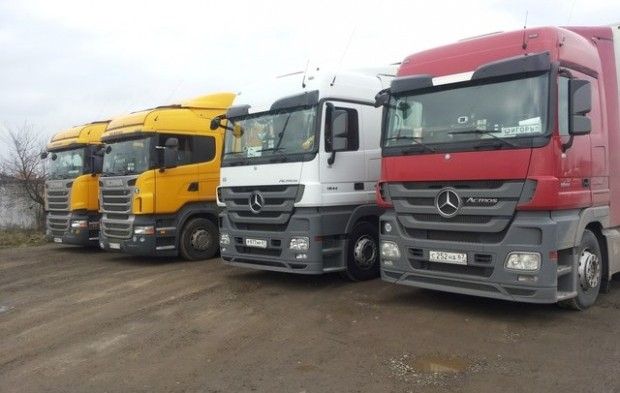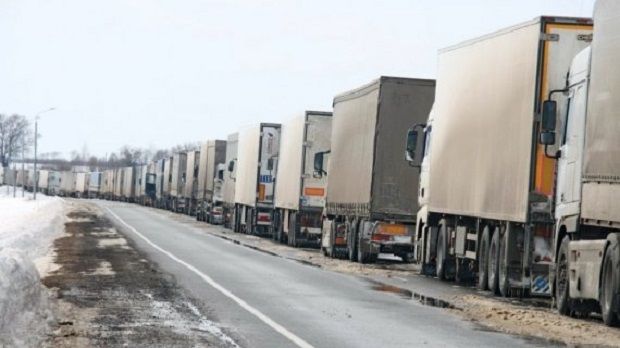
Victims of transit war
Ukraine and Russia have entered the new round of transit conflict that seems to be over soon. Both parties have already suffered losses. But Ukraine may lose much more – the trust of its Western partners.
At the moment, the Russian transit traffic of freight transport through the territory of Ukraine is unhindered. National Police ensure safe passage of the Russian trucks while peaceful protests continue at Domanove, Baturyn checkpoints and at the roundabout near Lviv. Protesters do not block the trucks. Ukrainian freight carriers also travel freely through the territory of the Russian Federation.
That is the outcome of the transit war between Ukraine and Russia – everything seems to have calmed down. But not only Ukraine incurred economic losses worth millions of hryvnias, it also somewhat damaged its political image. Some even compare Ukraine to Somalia, which can make Kyiv’s Western partners turn their backs to Ukraine despite some recent signs of a thaw in foreign business relations.
But the situation at the start of the conflict, on February 11, when activists blocked the transit of Russian trucks in 10 Ukrainian regions seemed to play into Ukraine’s hands. Due to disagreements between Poland and Russia on conditions of the bilateral agreement on freight transportation Warsaw sealed its borders, so the Russian trucks turned in the direction of Ukraine. This meant an increase in the flow of transit traffic through the country’s territory and, respectively, a considerable profit. Besides, the Polish-Russian confrontation could have been used to solve the problem of acute shortage of quotas on transit through Russia. Due to the temporary closure of the Polish border, Russia would have exhausted its annual transit quotas in Ukraine. Then Moscow would have nothing left to do but to ask for additional permits, and Kyiv could satisfy its own transit needs. But this was not meant to happen.
When the Russian government on February 14 banned the transit movement of the Ukrainian trucks, the Ukrainian Cabinet resorted to mirror measures the next day, and the parties launched negotiations. The talks resulted in mutual unlocking February 25 of transit movement of freight vehicles. However, activists said that they would continue blocking the movement of Russian trucks, despite the agreement. In particular, Oleh Tyahnybok, leader of Svoboda [Freedom] movement stated so.
Meanwhile, the Ministry of Infrastructure said that the National Police have situation under control, and no one is going to negotiate with Svoboda.
"For the first time, when the transit was blocked by Zakarpattia activists, we held talks with them on Facebook, without actually meeting them, as they were scattered across the country. Only local authorities and police physically communicated with them on the ground. We have laid out our arguments; they assessed them together with experts and recognized that further blocking of transit is not profitable to Ukraine in any way. We have never spoke to Svoboda, as what they do is in fact a PR campaign," head of department of road transport and strategic development of roads at the Infrastructure Ministry Roman Khmil has told UNIAN.
He also complains that the transit blockade has not given the opportunity to resolve Ukraine’s conflict over quotas with Russia.
"If we could at the moment let those Russian trucks through, then we would have it play into our hands. Every year, we bargain with Russia for more permits. They always cut our quotas, but because of this blockage we failed with this task," said Khmil.
Thus, the transit blockade increased the number of Ukraine’s problems. And nobody is sure that the new problem has exhausted itself.
Loss of revenues and markets

Ministry of Infrastructure stated that the Ukraine’s losses over the conflict are significant as a large share of the country’s revenues account for international trade and transit flows. Transportation losses from blocking transit traffic via Russia is UAH 6 billion, while the annual transit volume is about $1.8 billion.
According to ex-deputy minister of infrastructure, a transport expert Oleksandr Kava, only one day of halted transit through Russia cost the Ukrainian carriers UAH 5 million and an astonishing $5 million to exporters transporting their products through Russia.
According to the president of the Association of International Road Carriers of Ukraine, Leonid Kostyuchenko, a one-day delay for one Ukrainian truck cost EUR 120, and there were 600-700 vehicles locked on each side. At the same time, he said, the loss of land transit through Russia, which may be the result of the current conflict, may cost the Ukrainian carriers up to $4.2 billion per year.
Kostyuchenko said that Ukraine's losses from the blockade exceed Russia’s damage by five times because the volume of transit of freight trucks through the territory of the Russian Federation is several times higher than such Russian transit via Ukraine.
Khmil predicted that the continued blocking of transit may put to a halt our traffic flows to Asia and transportation to Russia; then the rail transit will stop, and then the foreign companies will gradually cease to transport goods through our territory, because we violate international agreements.
"Then we will be thrown out of the WTO, we will lose support of the U.S. and the EU," said Khmil.
According to Kava, the Western partners have already responded to the ongoing protests in Ukraine, and their response is absolutely negative.
"The EU countries have maintained trade relations with Russia: the volume of trade between them in 2015 was 10 times greater than the volume of trade between Ukraine and the EU. If the blockade does not stop, there is a risk that Ukraine will lose part of its transit, because, as experience shows, it’s much easier to lose reputation of a reliable transit country than earn it," said Kava.
On top of that, Ukraine risks losing the lion's share of foreign exchange earnings due to the loss of status of a transit country.
"As a result, Belarus and Poland will very much benefit from this, because all flows will be going through their territory, while we will remain with nothing," said Khmil.
By the way, according to the Ministry of Economic Development of Ukraine in January-February this year, freight traffic to Asia fell by 60%.
Options for eliminating threats
Minifrastruktury calls on carriers that stopped the movement of their vehicles fearing the blockade, to renew the traffic, adjusting the route to avoid trouble spots, or ordering a special traffic escort by the National Police from border crossing points.
This service costs UAH 1,170 per vehicle, while the Ukrainian carriers pay $350 for Russian convoys to Kazakhstan, which transit through Belarus.
Ukrainian carriers are not really happy with such rates, to put it mildly. According to Khmil, now Ukraine is trying to cancel a special escort through the WTO. In this situation, the latest events look quite awkward.

"The European Commission complained, while the WTO was interested in what was going on as we have limited the Russian transit and at the same time complained about the Russians. We have filed a complaint against the Russians because of the fact that they introduced the police escort to Kazakhstan for us. Now we have weakened our negotiating position at the WTO. Meanwhile, the European Commission protects European businesses," said Khmil.
Thus, there is a risk of complete closure of the Russian territory for the Ukrainian transit. But there is still a way to resolve the issue.
"Ukraine may apply for protection of its rights in the WTO and international courts, and there is a fairly high chance of getting a positive decision. However, the process may time take between six months and several years," said the lawyer, managing partner of JSC Suprema Lex, Viktor Moroz.
According to the lawyer from De Jure legal consulting company, Vladyslav Martynchuk, the WTO has established itself as an effective platform for the settlement of disputes, which usually ended in compromise.
So, Ukraine has once again found itself in a difficult situation, which caused the country great economic damage and hurt its image. With regard to the risk of a total ban of transit through Russia, Kyiv will hardly find a way to reach compromise with the Kremlin in case it happens, as Moscow continues to pursue a policy of aggression against Ukraine.
Oleksandra Danko (UNIAN)

